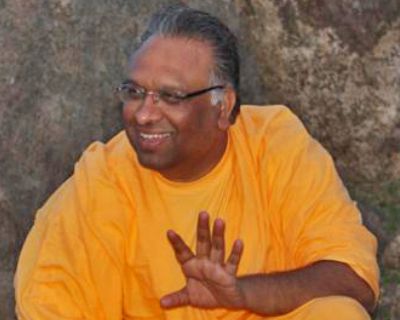Indians are generally philosophical. Weakly philosophical. Most aren’t exactly interested in deep, truth-finding philosophy, but they use philosophy to discover an explanation that consoles them, settles them, today.
So, most scriptural statements and saintly words are etched in our psyche, providing us with immediate convincing explanations, or consoling us. Finally, the heart must be settled with something of thought!
Since Science or Economics or Law don’t settle us within, we tend to regard them as external sciences, while philosophy and words from Yogis and Saints tend to resonate within for long, creating a long-term impact. Yet, as I remarked earlier, even if the effect is long-lasting, and we use those words in every circumstance, we tend to organise that into a belief. Naturally, when situations stretch and test us, none of these thoughts actually work. They no longer console, and they lose their sheen of explanatory power.
For example, pūrvakarma is one such belief. That there exists a law of Karma, which runs the world, and all past unfinished or unattended actions visit us in some form or the other in the future, in inexplicable ways. Like this corona virus, to take an immediate example. So many would believe that this is the collective Karma of the world visiting us, and we all have to suffer gamely, receive its impact well, so that the stock of its fury empties itself thoroughly. God forbid, but in the next few weeks to come, if the virus attains greater scale, many in India are likely to turn philosophical. They will accept death and destruction easily. They are likely to give up mentally. And, they need lots of hope, swift hope, to continue to be vigilant and fight the virus.
Indians tend to give up easily, saying, “It is not working! No point!” When you give up mentally, then, you need more assurance than usual, something compelling out there, to reinvigorate and prod you again into action.
All human systems tend to experience fatigue. If a war is prolonged, war personnel also experience fatigue. But, that fatigue is of the body, of having to fight relentlessly with no end in sight. Losing sleep, dealing with endless work, seeing every system around you wilting, yet, to keep going despite the grim reality of a terrible shortage of resources. Very often, such fatigue even spawns a simultaneous resilience: ‘now that we have begun it, let us finish it well, and not give up until then’.
We mustn’t use philosophy to escape. A philosophy that tends to ignore the grimness of the reality that faces us is indeed weak, and is to be shed mercilessly.
‘Give up the weakness of the mind’, Swami Vivekananda would have exhorted us during these times!
With that warning resounding in the background, if we can step back for a while and see the unfolding epidemic, there are things to be inferred. Understood. Reflected upon.
Look at the virus itself. It doesn’t even have a body. Therefore, there is no material that we can deal with. It is neither male nor female. Hence, you can’t appease or seduce it in a particular way, nor does the virus take to certain kinds of bodies. It doesn’t eat; that is not why it attacks your body. Therefore, if you refuse to be eaten, you don’t avoid the virus. It doesn’t seek to control like a dictator or an external aggressor; the virus has no such ego. Hence, you can’t defeat it by protest, or non-co-operation, or running something similar to a military expedition against it. The virus is not seeking to lodge itself into you, create a nest for its procreation, and generally thrive and grow. It doesn’t multiply.
The virus is merely a code. It infects the body cell, the RNA in this case, with a code. And, your body cell, which is infinitely more capable, resilient, surrenders its intelligence, and now begins working according to the code provided by the virus. You could describe this as ‘getting influenced’, for the sake of common understanding. Typically, your body cell has not been able to identify, cognise the virus, and deal with it accordingly.
All it takes is for one healthy, wholesome, human cell to cognise the virus, see it straight, and deal with it. That stops the virus in its tracks. All medical intervention in terms of drugs and vaccines, when discovered tomorrow, shall merely intervene specifically to slow down the virus movement and end its operations. They shall defeat the momentum of the virus, and hence, the virus will be made to give up. But, when your body cell recognises the virus, it shall deal with the virus completely differently.
Look at the scenario that all of us, across the world, are facing. One single micro-germ is sliding unchecked across populations. And, the human cell doesn’t seem to have an answer. Which only means that despite such sophistication and evolution, it is possible that the human cell still doesn’t have answers to a silly virus. All that evolution that Darwin talks about, the entire biological strength the human body is supposed to have garnered, the very power of having evolved successfully for millions of years, comes to nought when pitted against a simple virus. Such a fantastic and marvellous evolution can be stopped on its tracks! Ended! By an insignificant upstart, who doesn’t even have a motive to destroy, who hasn’t even found the necessity or dignity to have a body of its own!
Do you get the message clearly? If you are a fit person, if your Prāṇashakti shines, and if you think you are very healthy, the virus doesn’t seem to care. Rather, it doesn’t recognise such fitness or ideas of health. Of course, the virus finds poor heart and lung conditions conducive. It doesn’t exactly prefer the old over the young; the virus finds an already weakened system easier to infect.
Keeping these observations about the virus in mind, let us now draw philosophical inferences.
An infinitesimal part of this creation can easily defeat and bring down the most sophisticated and highly evolved species, the creator’s jewel-pride so to say, in just a moment. Not out of jealousy, not out of motive. But, unintended! Just like that! So, that is the first lesson to learn. That you and I, however sophisticated and refined, however careful about our growth, are incredibly vulnerable. Vulnerability is the fact, whether you cognise it or not. So, protecting your growth or evolution or carefully cultivating sophistication is of absolutely no use here.
That is the first lesson. Leading a life that is aware of its vulnerability is far more critical and truthful than seeking to groom oneself into something better.
A more important lesson. All our lives are dedicated to some priority. Some may consider family as priority. Others may view wealth-creation as priority. Some others may find knowledge as priority. Many may consider individual happiness as priority. Quite a few would consider collective human happiness, welfare, and harmony as priority. So many would be ambitious about growing into a far bigger entity than they are currently; that would be their priority. Many would have realised the role of destiny and circumstances and respond to how situations move, considering such a response alone as the top priority. Some may make a new future the focus; many may be rectifying their past—that is what they would deem as priority.
This virus defeats all. It defeats the intellectual, the Vedāntin, the Yogi, the communist, the capitalist, the artist, the worshipper of fitness, a patriot, a zealot, a good man, a bad man, the hero, the villain. It doesn’t leave out the comedian too! No human seems to have an answer to this virus, right now, isn’t it?
So, whether you have led a life of character in the past, or you have led a sinful life, the virus doesn’t seem to categorise you, or choose to attack you differently. You get the point, don’t you?
Whatever be your priority, it depends upon something fundamental like your human body, isn’t it? The platform upon which the priority can be executed. The platform that we take for granted when we go about accomplishing our priority. The virus has shown that that very platform is vulnerable. Most of us appear healthy not by awareness, but by blindness. We take the platform, in this case, the body, for granted, forget it, and then erect the superstructure of priorities. A simple virus reminds us that the entire superstructure can come falling apart, because the platform itself is vulnerable. It was always exposed. Just that we were blind.
Human life has many such fundamental platforms. The body itself is one. The Pañcakośa-Viveka, described in the Taittirīya Upaniṣad, indicates five such platforms. Unaware of these, we go about being busy on any platform; we are being vain. You cannot organise anything as priority in your life, make that the centre of your daily existence. If you have managed to do that, it only shows that you have forgotten the vulnerability of the platform you stand on.
That is the second lesson. The Order of this Universe finds ways and means to somehow remind you of the importance of what you take for granted unconsciously.
Receive that reminder well, and make a promise to yourself that you will never forget those vulnerable platforms ever. If you took the message rightly, no longer will your energies ever turn vain or venomous. You would be far more ready to lead a life that is not centred on anything, but yet, not distracted or out-of-focus.
There is a third vital lesson that one can draw. For some of us, some day in the future, this battle with the virus can turn personal. Which means, not only are we likely to get infected, but we may even be hospitalised as the symptoms become severe. The husband or wife, the immediate family, are, of course there. They are doing everything they can. The hospital, its staff and facilities, are doing everything they can. The doctor is probably your friend too, who is doing his or her best. The Government is supporting everything possible. All your well-wishers pray for your quick recovery.
None of that is real now. Because, now, you are alone with the virus. The virus is far closer to you than all these people, systems, and good wishes. You are all alone. Whether your body is fighting or succumbing, you are all alone. And, you are intimately alone; you will only get scared and frightened as long as the virus appears distant, and your relative feels closer. When you are intimate with your body and the infection alone, then everything else is distant.
That aloneness, that stillness, that pure duality, where you are in daily contact with the ‘other’, whether you wrestle with it, are cordial with it, or have succumbed to it, that duality, where you are utterly alone with the ‘other’ is a crucial dimension to realise. If you can live there, even for a while, without seeking belief or thought or solace or prayers, without panicking, then you have done something extraordinary.
That pure duality is what you are supposed to have discovered even while you dealt with life, much before this virus came. Discover that aloneness, and put the whole world on the side of the ‘other’. Only then can you be a great student of the Whole. A worshipper of the Whole.
That is the third lesson. When the ‘I’ sees the Whole alone, and nothing else, and it never slips from that recognition, it is indeed seeing Viṣṇu. The Whole.
When you see the dance and play of the Whole, Viṣṇu, no longer can there be any fear or insecurity or need for protection. When you have no fear, you no longer need any consolation or philosophy to convince you. You don’t need hope or confidence.
Whether you live or die, you shall remain in His lap.








